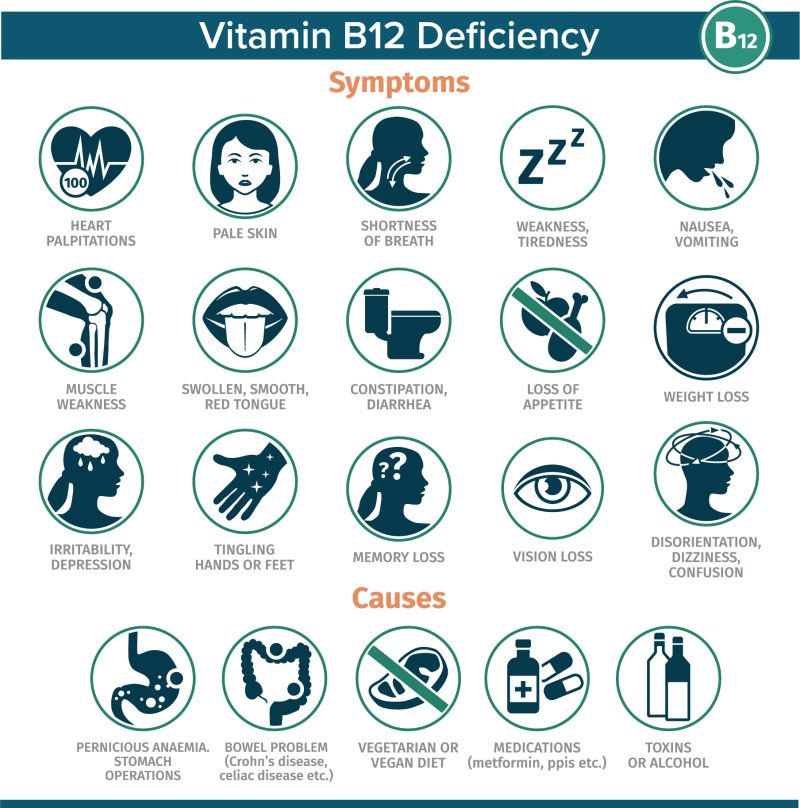Is a B12 Deficiency Making You Sick?
B12 deficiency can sneak up on you. You’re feeling strong and energetic, thinking clearly, feeling upbeat, and then gradually, maybe over the course of several months or even years, you begin to notice that you’ve lost the pep in your step.
Your mind and memory aren’t as sharp as they once were. Even mildly strenuous physical activity leaves you breathing hard, and instead of feeling pumped up after exercise, you feel exhausted.
What happened?

Without a thorough workup, complete with analysis of targeted lab tests, you’ll never know what’s causing you to feel rundown. It could be stress, a lack of (or too much) exercise, a buildup of environmental toxins, or an undiagnosed infection. Or it might be any number of nutritional deficiencies, a combination of those deficiencies, or countless other possible contributing factors.
That’s why I always recommend consulting with a healthcare professional who is attached to a functional medicine practice and obtaining a complete workup and personalized plan of care before starting any treatment, or even taking an over-the-counter supplement. Until you test, you don’t know the root cause of what’s ailing you or what your body may be lacking.
A complete workup often reveals numerous contributing factors and root causes, and one common factor is a vitamin B12 deficiency. Unfortunately, diagnosing and treating B12 deficiency and its underlying cause(s) is more complicated than just ordering a blood test and taking a B12 supplement. In this post, I explain why. But first, it’s important to recognize the symptoms and possible causes of B12 deficiency.
Symptoms of Vitamin B12 Deficiency
Vitamin B12 plays an important role in physiological processes that affect different systems in the body. As a result, symptoms of B12 deficiency can vary considerably, both in symptom type and severity. Here are some common symptoms associated with B12 deficiency:
- Fatigue and weakness: Feeling unusually tired and weak is one of the most common symptoms of B12 deficiency. This is because B12 is essential for the production of red blood cells, which carry oxygen throughout the body.
- Anemia: B12 deficiency can lead to a type of anemia called megaloblastic anemia. In this condition, red blood cells are larger and fewer in number, which can result in reduced oxygen-carrying capacity and lead to fatigue, pale skin, and shortness of breath.
- Nervous system dysfunction: B12 plays a crucial role in maintaining the health of the nervous system. Deficiency can lead to symptoms such as numbness, tingling, or a “pins and needles” sensation in the hands and feet. It can also cause difficulty walking, balance problems, and even affect cognitive functions including memory and concentration.
- Neuropsychiatric symptoms: B12 deficiency has been associated with mood changes, including depression, anxiety, and irritability. Some individuals may experience more severe neurological symptoms like confusion, memory loss, and even hallucinations in severe cases.
- Digestive problems: B12 deficiency can lead to digestive issues, such as loss of appetite, weight loss, and constipation.
- Glossitis and mouth ulcers: Deficiency of B12 can cause inflammation of the tongue (glossitis) and mouth ulcers.
- Yellowing of the skin: In severe cases, B12 deficiency can affect the liver’s ability to process bilirubin, leading to jaundice and yellowing of the skin and eyes.
- Heart palpitations and shortness of breath: B12 deficiency can impact the cardiovascular system, leading to palpitations and a rapid heartbeat. Shortness of breath can also occur due to the reduced oxygen-carrying capacity of the blood.
- Vision changes: Some individuals with B12 deficiency may experience blurred vision or changes in vision.
Recognizing the Causes of B12 Deficiency
Treating vitamin B12 deficiency requires more than just supplementing with B12. I always recommend that you first need to identify and address the root cause of the deficiency. In addition, knowing what’s causing it can help you make better informed decisions about the B12 supplement that’s likely to be most effective. Vitamin B12 deficiency can manifest in several different types, each with distinct causes and characteristics: Continue reading…



